Faithful Remembering: Spiritual Practices to Recall God’s Goodness in Marriage

Scripture often invites us to remember—stack stones, sing the story, pass down the testimony—because memory strengthens faith. If your marriage is in a tough stretch, spiritual remembering can re-center your hearts. Here are four simple practices: a monthly “God has helped us” list, a prayer walk using old photos, a gratitude psalm you write together, and a Sabbath slideshow that reminds you Who holds your future.
Why Faithful Remembering Matters in Marriage
 When seasons of marriage feel heavy, it’s easy to think God has gone quiet. But often, He’s just waiting for us to remember. Throughout Scripture, God continually calls His people to pause and look back—because remembering His past faithfulness fuels trust for the future.
When seasons of marriage feel heavy, it’s easy to think God has gone quiet. But often, He’s just waiting for us to remember. Throughout Scripture, God continually calls His people to pause and look back—because remembering His past faithfulness fuels trust for the future.
“Remember the Lord your God, for it is He who gives you the ability to produce wealth” (Deuteronomy 8:18).
“Remember His marvelous works which He has done” (1 Chronicles 16:12).
In marriage, faithful remembering becomes a spiritual discipline—a way to see your history as proof of God’s ongoing care. The same God who carried you through that move, that diagnosis, that financial strain hasn’t changed.
When you practice faithful remembering, you’re not denying current hardship; you’re anchoring your heart in evidence. It’s one of the simplest and most profound spiritual practices for couples: memory as worship.
This post connects beautifully with Celebrate the Ordinary: How Noticing Small Joys Changes the Mood of Your Home. While that post teaches couples to notice small blessings, this one deepens it into worship—turning gratitude into faith.
The Theology of Remembering
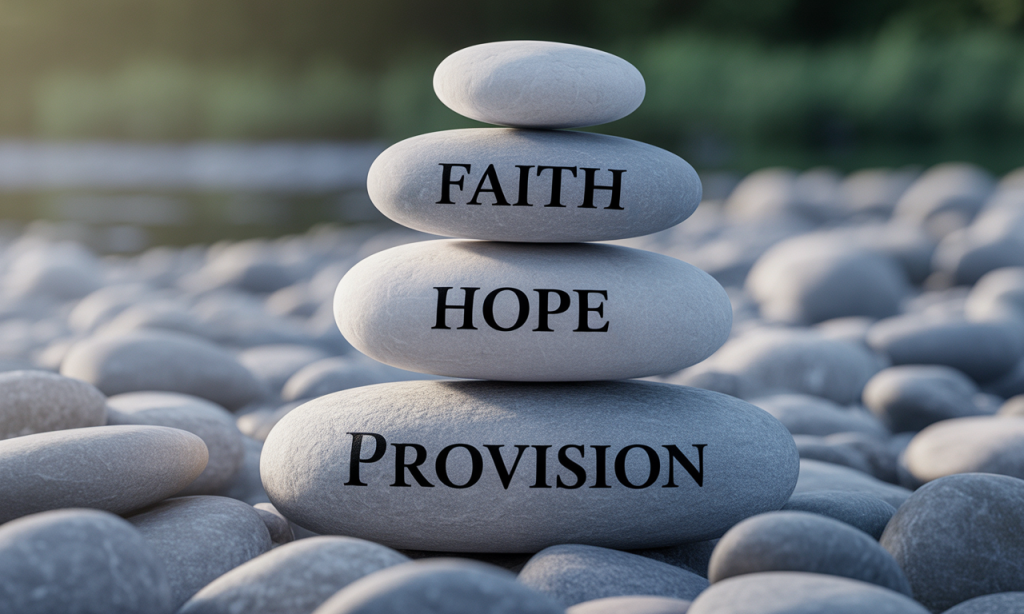 From Genesis to Revelation, God ties remembrance to renewal. Every altar, every feast, every psalm of thanksgiving carries a single thread: remember so you don’t forget Who your story belongs to.
From Genesis to Revelation, God ties remembrance to renewal. Every altar, every feast, every psalm of thanksgiving carries a single thread: remember so you don’t forget Who your story belongs to.
In marriage, forgetfulness often leads to fear. When you forget what God has already done, today’s problem looks final. But when you recall His goodness, your perspective resets—you start seeing your current challenge as another chapter, not the end of the book.
Psalm 77 models this perfectly:
“I will remember the deeds of the Lord; yes, I will remember your miracles of long ago. I will consider all your works and meditate on all your mighty deeds.”
Faithful remembering isn’t nostalgia—it’s spiritual strategy. It helps you interpret today through the lens of yesterday’s deliverance.
You’ll see echoes of this in When You Can’t See a Way Forward: How Looking Back Rebuilds Hope, where memory becomes a bridge between despair and faith.
Practice #1: The Monthly “God Has Helped Us” List
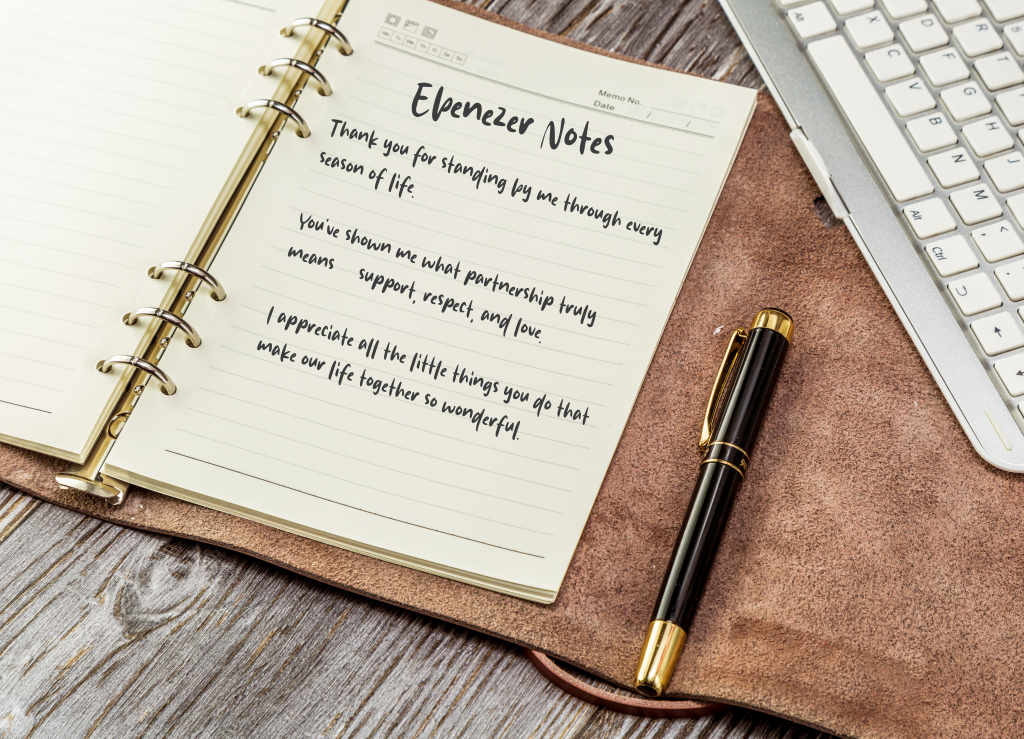 In 1 Samuel 7:12, Samuel sets up a stone and names it Ebenezer, meaning “Thus far the Lord has helped us.” You can create your own marriage Ebenezer through a monthly “God Has Helped Us” list.
In 1 Samuel 7:12, Samuel sets up a stone and names it Ebenezer, meaning “Thus far the Lord has helped us.” You can create your own marriage Ebenezer through a monthly “God Has Helped Us” list.
How to do it:
- On the first Sunday of each month, sit together with a notebook or digital journal.
- Title the page: “God has helped us this month by…”
- List even the smallest evidences of grace—paid bills, a calm conversation, laughter after tension, a friend’s encouragement.
- End with a short prayer: “Thank You, Lord, for every unseen mercy.”
Keep your notebook where you can see it. Over time, you’ll have a living timeline of His faithfulness—a visual of His presence woven through your story.
This echoes the Memory Bank concept from The Memory Bank: Saving Good Moments for the Days You Forget, but adds a sacred lens—God as the Author behind every good gift.
Practice #2: The Photo Prayer Walk
 Every photo tells a story—but not every story has been prayed through. The photo prayer walk combines reflection, gratitude, and intercession.
Every photo tells a story—but not every story has been prayed through. The photo prayer walk combines reflection, gratitude, and intercession.
How to do it:
- Choose 10–15 photos from your shared history—wedding day, milestones, vacations, even difficult seasons.
- Walk together through your home or neighborhood.
- With each photo, thank God for what He did in that season.
- Pause occasionally to pray for your present and future with that same trust.
You can do this physically (with printed photos) or digitally (on your phone). The key is walking—moving forward as you look back.
As you pray, you’ll notice patterns: prayers answered differently than expected, kindnesses you missed in the moment, resilience you didn’t know you had.
If you’ve built a 30-Photo Highlight Reel, this walk turns that project into a faith ritual. Each image becomes both a memory and a testimony.
Practice #3: Write a Gratitude Psalm Together
 The Book of Psalms is full of human emotion—fear, confusion, joy, awe—but all directed toward God. Writing your own gratitude psalm turns your marriage into a shared altar of words.
The Book of Psalms is full of human emotion—fear, confusion, joy, awe—but all directed toward God. Writing your own gratitude psalm turns your marriage into a shared altar of words.
How to do it:
- Begin with “Lord, we remember…”
- Name moments where you saw His hand in your story.
- Include specific lines like, “You carried us through our move,” or “You softened our words when we were tired.”
- End with a declaration: “We trust You for what comes next.”
You can read your psalm aloud during quiet time or record it as a voice note to revisit later.
Writing together invites vulnerability and humility—it acknowledges both human effort and divine help.
If you’ve ever practiced The Five-Minute Rewind: A Micro-Practice for Hard Days, this builds on that skill by shifting the focus from emotional recovery to spiritual remembrance.
Practice #4: The Sabbath Slideshow
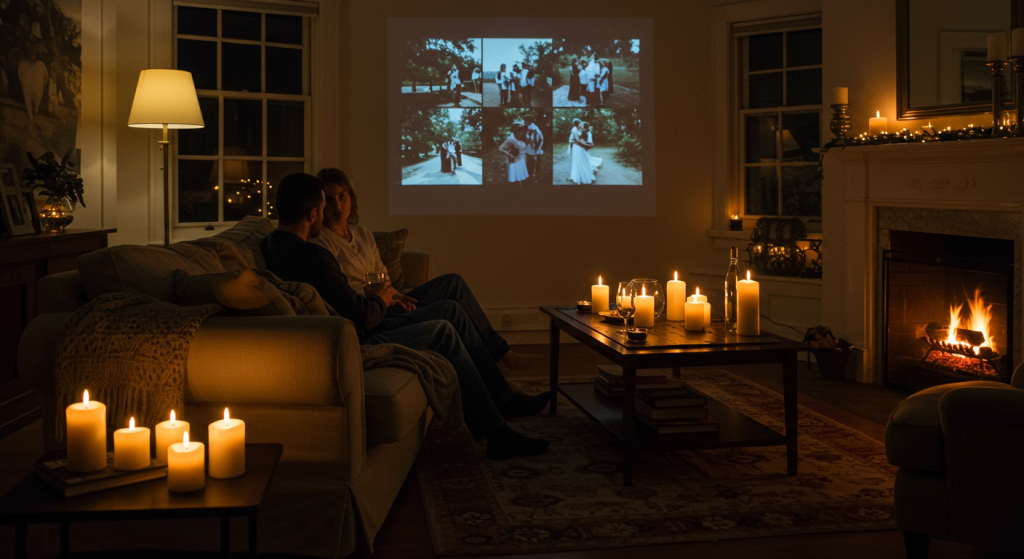 Sabbath isn’t just rest—it’s remembrance. God built the seventh day as a rhythm of remembering who He is and who we are in Him.
Sabbath isn’t just rest—it’s remembrance. God built the seventh day as a rhythm of remembering who He is and who we are in Him.
A Sabbath slideshow helps couples honor that rhythm visually and spiritually.
How to do it:
- Set aside one Sabbath evening each month.
- Create a short slideshow (or replay your highlight reel) featuring photos from your life together.
- Watch it in silence or with soft worship music.
- End by praying: “Thank You, Lord, that the same hand that guided us here will guide us still.”
This practice anchors your Sabbath in gratitude. It also strengthens your spiritual intimacy—because you’re remembering not just your story, but God’s story through you.
This ritual pairs naturally with Photo Rituals That Heal: Turning Your Camera Roll into Connection, expanding that idea from emotional healing to sacred remembering.
When Faithful Remembering Feels Hard
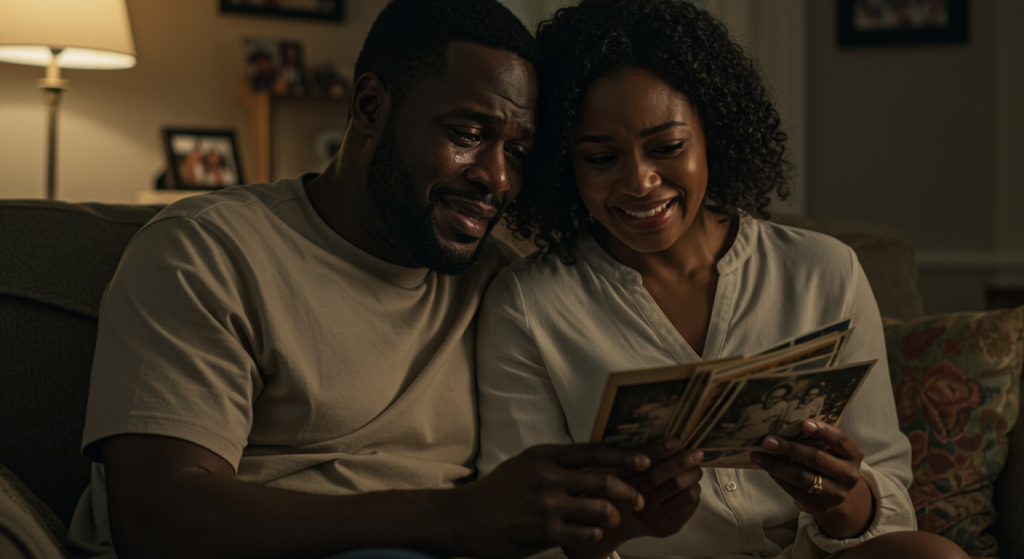 Sometimes, looking back doesn’t bring peace—it brings pain. Maybe past seasons include loss, betrayal, or prayers that went unanswered.
Sometimes, looking back doesn’t bring peace—it brings pain. Maybe past seasons include loss, betrayal, or prayers that went unanswered.
Faithful remembering doesn’t mean romanticizing the past. It means trusting that even in pain, God was still present.
Here’s how to approach it gently:
- Start with the smallest evidence of grace: “We survived.”
- Ask, “Where was God even when I didn’t see Him?”
- Reinterpret those seasons as places where endurance grew.
Over time, even the hard chapters begin to testify—not of perfection, but of perseverance.
If this step feels heavy, revisit When Hope Feels Impossible: Why Future-Visualization Backfires (and What Works Instead) for encouragement on finding faith when forward-looking feels out of reach.
The Faith-Connection Between Remembering and Gratitude
 Faithful remembering naturally leads to gratitude, and gratitude naturally strengthens unity. When both spouses begin recognizing God’s fingerprints on their shared story, blame softens, tension eases, and affection grows.
Faithful remembering naturally leads to gratitude, and gratitude naturally strengthens unity. When both spouses begin recognizing God’s fingerprints on their shared story, blame softens, tension eases, and affection grows.
Gratitude in marriage is not about ignoring pain—it’s about narrating hope. It gives your mind a new script when stress tries to rewrite your story.
You can nurture this atmosphere through small habits like the Ordinary Joy Audit from Celebrate the Ordinary: How Noticing Small Joys Changes the Mood of Your Home. When you pair that with spiritual remembrance, everyday gratitude becomes worship.
Making Faithful Remembering a Lifestyle
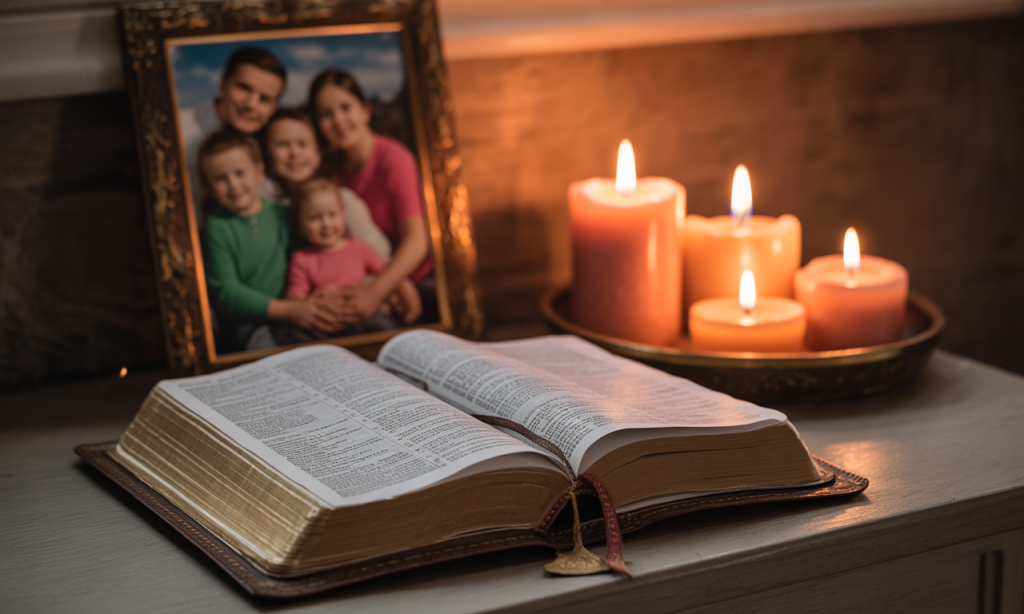 Here’s the secret: these practices aren’t meant to stay isolated. Together, they form a lifestyle of remembrance—where gratitude, worship, and hope become daily rhythms.
Here’s the secret: these practices aren’t meant to stay isolated. Together, they form a lifestyle of remembrance—where gratitude, worship, and hope become daily rhythms.
You might:
- Keep your “God Has Helped Us” notebook open on the counter.
- Pray through your photo gallery once a month.
- Write one line in your gratitude psalm every week.
- Watch your Sabbath slideshow before family prayer.
In time, your home becomes a living testimony of Psalm 126:3—“The Lord has done great things for us, and we are filled with joy.”
Faithful remembering changes how you interpret everything. It transforms routine moments into altars and turns your house into a sanctuary of hope.
For practical structure on weaving these into your calendar, see Design Your Marriage Rhythms: The Rituals & Resets Handbook—a framework for turning spiritual practices into sustaining habits.
Bringing It All Together
 Faithful remembering is not a backward gaze—it’s a forward anchor. When you recall God’s goodness in your marriage, you remind your heart of what’s still possible.
Faithful remembering is not a backward gaze—it’s a forward anchor. When you recall God’s goodness in your marriage, you remind your heart of what’s still possible.
Through a simple list, a photo prayer walk, a shared psalm, or a Sabbath slideshow, you begin to weave gratitude into the fabric of your story. You start to see your marriage not as random events, but as a narrative authored by grace.
And the next time storms come—and they will—you’ll have evidence: stones stacked high, photos prayed through, words of praise written by your own hands. Proof that the God who was faithful then is faithful now.


